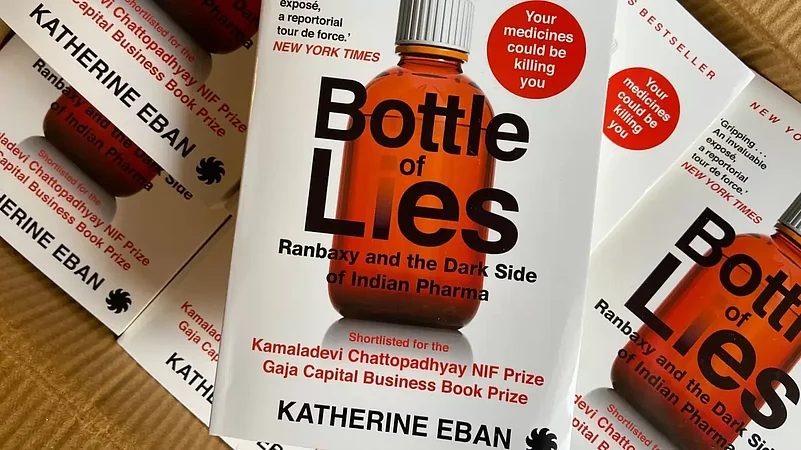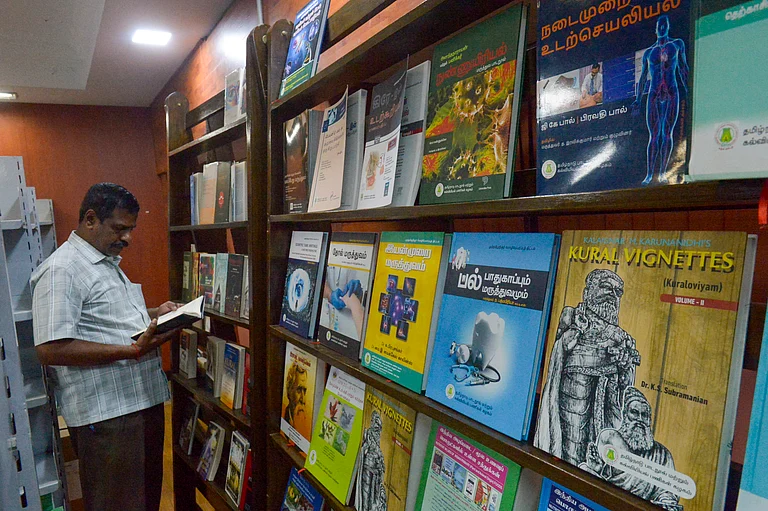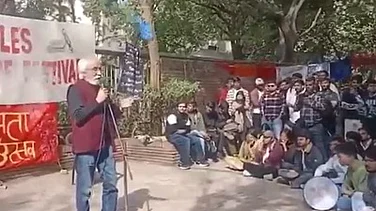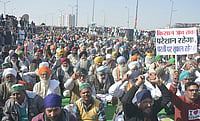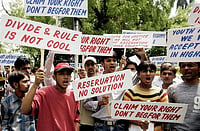For the masses in poorer countries in Africa that cannot afford Western branded drugs, the generic drugs from India —the pharmacy of the world— are the only option. In Bottle of Lies: The Dark Side of Indian Pharma, American investigative journalist Katherine Eban details the institutional malpractices by some Indian pharmaceutical comapnies that at times turn this boon into a bane.
Eban’s attention was brought to generics in 2008 when a podcaster reached out to her with a request to investigate complaints regarding generic drugs. That led to a 10-year investigation, resulting in longform investigative stories and Bottle of Lies that was published in 2019. In 28 chapters spread across seven parts, the book reconstructs the rise and fall of Ranbaxy —once described as the crown jewel of Indian pharma— and the quest to uncover its astronomical growth fuelled not by groundbreaking research and development but by fake trials, fabricated reports, and institutional fraud.
At the onset, Eban presents certain facts that highlight the importance of Indian pharma industry. She notes that 40 per cent of all generics sold in the United States —the largest drug market in the world— are from India and 80 per cent of all active pharmaceutical ingredients (API) are sourced by the United States from India and China.
“Without them, every large-scale government health program —the Affordable Care Act, Medicare Part D, the Veterans Health Administration, charitable programs for Africa and the developing world —would be unaffordable,” notes Eban about generics. Speaking plainly, there would be no affordable healthcare without generics.
Based on interviews with 240 persons ranging from pharma executives to regulators and investigators and review of around 20,000 documents and reports, Bottle of Lies presents not just an inside account of Ranbaxy scandal but also exposes the general failure and fewer successes of US Food and Drug Administration (FDA) to catch malpractices and hold companies accountable.
Eban writes the book in third person and it at times reads like a whodunit. In avoiding the first-person narration, she keeps herself completely out of the story and instead becomes an omniscient narrator. The central character of the story is Dinesh Thakur, a pharma executive who leaves Ranbaxy after learning about the fraud and becomes a whistleblower. Through his dogged pursuit of FDA, Eban shows what one person can achieve. What can you just by yourself — you must have heard in your life at some point. Well, Bottle of Lies shows that you can bring down a multinational giant.
But that’s not the purpose of the book. Eban’s purpose is to not just expose Ranbaxy or paint the Indian pharma industry in a certain light. In Bottle of Lies, she traces the Gandhian roots of generics. Mahatma Gandhi suggested Cipla founder KA Hamied to produce malaria and vitamin medicines. This put him on a path to produce affordable drugs. By 1940s, Cipla made birth control for 20 cents that cost $8 in the West. Several decades later, Hamied’s company would become the pioneer of generics and the ambassador of Indian pharmaceutical industry.
As you read Bottle of Lies from the points of view of Thakur, Cipla’s Hameid, or American investigators and lawyers, you realise the book is also a tale of contrasting characters and indictment of human greed. While there is Thakur the whistleblower who was brought up on the tales of righteousness from Indian epics or Hamid who traces his company’s roots to a Gandhian vision, there is also Ranbaxy that prioritises profits above everything.
Eban writes, “Two types of companies emerged. There was Cipla, where the managing director Yusuf Hamied had been a disruptor of status quo. He had used his position to bring in the pharmaceutical marketplace to help bring price relief and needed medicine to world’s most disadvantaged patients…But there was another business model, that of jugaad, one that aimed to get to the desired outcome by the shortest means possible. That had been ranbaxy.”
Bottle of Lies shows that a company or a regulator is only as good —or as bad— as the people running it. The same FDA under lax inspectors approved flawed manufacturing plants but the same plants under committed investigators and sharp inspectors flagged plants after plants and led to Ranbaxy’s guilty plea in the court.
Eban also balances the book in ‘show versus tell’ aspect. While literary commentators insist on authors showing, not telling, sometimes readers need to be told. Sometimes, the author needs to hold the readers' hand and guide them through the story — particularly a story as important as this where you cannot afford to miss anything. Eban breaks down the complex science of pharma and tells the reader what a particular practice means. On other occasions, her writing makes the reader pause and drown the implication.
Early in the book, Eban writes about the devastation of AIDS in Africa. At one point, up to a quarter of the population in some pockets was suffering from the disease. The Western branded drugs were out of reach. The Indian generics cost a mere quarter of the branded drugs. One of the companies making these generics was Ranbaxy. In a later scene, Thakur learns that the tests for their HIV-AIDS medicines had been faked thoroughly. Spread over several pages, the episode makes you stop and rethink. Life is a tussle between what it could be and what it is. The poorest and the most needy, those at the core of the idea of generics, are also its worst sufferers.
Towards the end, Eban sums up, telling readers bluntly: “Dr. Hamied’s revolution, as it thundered along, offered generic drug companies the chance to act as global equalizers and make the same cures available to the wealthy and impoverished alike. But what Thakur had first documented on a spreadsheet at Ranbaxy, and what Baker observed in manufacturing plants throughout India, was not the fulfillment of that ideal. It was the ultimate subversion and exploitation of it — making the worst medicine for the poorest patients, with life-and-death consequences for us all.”
However, Eban’s Bottle of Lies is not just the indictment of malpractices in some sections of Indian pharma. It also indicts the regulator —mainly the US FDA— that took years to hold Ranbaxy accountable. Again, the running theme of contrasting characters and human nature is at play here — a classic ‘show, don’t tell’ employment. While there are American lawyers and investigators overworking to make a case against Ranbaxy, there are superiors that are not convinced or some who you can’t figure out whose side they are.
Bottle of Lies also shows that while one-off slips or occasional mistakes are one thing, widespread maleficence is often built into company cultures, such as the singular focus to drive profits and top executives saying “it’s just Blacks dying” when subpar drugs being sold in Africa are mentioned to them.
While Eban’s book is an essential primer on what ails the world of pharma, there is one notable exception. Bottle of Lies almost entirely skips the Indian patients — home to Ranbaxy and other companies exposed in the book. While the United States and Africa import Indian drugs in bulk, the main market is of course India. In one of the most hard-hitting scenes in which Thakur learns about the extent of fraud at Ranbaxy, a Ranbaxy executive bluntly tells him that “100 per cent” of dossiers submitted to Indian regulators for approval were faked while the percentage for the United States and Europe was 50-60 per cent.
Bottle of Lies is also an indictment of the regulatory frameworks from India to the United States that have repeatedly fallen short of checking malpractices. At a time when deaths have been reported from Gambia to Uzbekistan and the United States among people who allegedly used Indian medicines in a span of just a few months, Bottle of Lies is more relevant than ever.
(Katherine Eban's Bottle of Lies: The Dark Side of Indian Pharma is published in India by Juggernaut Books. It was first published in 2019 in the United States by HarperCollins.)






